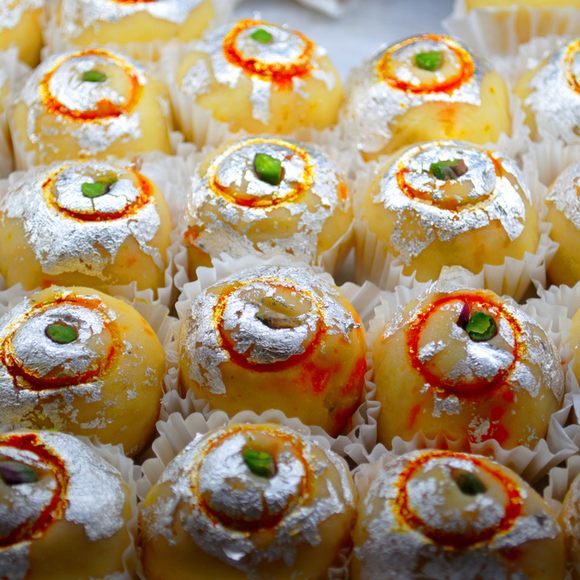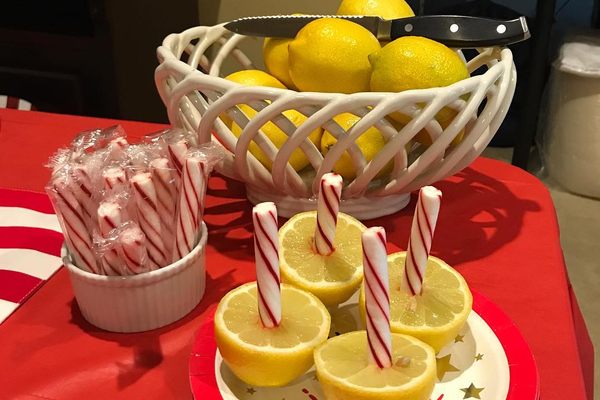Ingredients & Condiments
Warq
This edible silver garnish has long added bling to South Asian cuisine.
Walk into any Indian sweet shop around the late-autumn Diwali festival and—if you can see through the haze of firecracker smoke coming from outside—you’ll discover mountains of milky sweets piled behind the glass, decked out in pastel colors and glimmering squares of precious metal. Called chandi ka warq, these flavorless, micrometer-thin sheets of silver (chandi in Hindi) are commonly found on sweets such as barfi (a milk-and-nut-based sweet paste), badam ki jali (an almond biscuit-like treat), and qubani ka meetha (an apricot paste). Gold, or sone ka, warq also exists, but is less common. Besides sweets, warq is often pressed onto paan, an elaborate breath-freshener and mild stimulant made of mixed spices and areca nut wrapped in betel leaves.
Warq isn’t just prized for its beauty. Some trace the use of silver foil in food to ancient times, when Ayurvedic texts recommended it for its medicinal and purifying properties (modern science has confirmed that the metal is antimicrobial). Others credit the Persian tradition of gilding food with the introduction of warq to the subcontinent. What is certain, however, is that the art of bedazzling dishes with warq was perfected in the decadent delicacies of the Mughals, with kingdoms from Hyderabad to Lucknow to Rampur incorporating the foil into their courtly cuisines as well.
Warq is traditionally made by skilled silversmiths who pound sheets of precious metal by hand. In recent years, however, the efficiency of machine-made warq has put traditional artisans out of work, with some predicting that manual warq-making may die out altogether. Another dubious modern innovation: the proliferation of fake warq in the form of super-thin aluminum foil. While traditional silver warq is safe to consume, these modern imitators are not, and the Indian government has begun regulating warq production more tightly in response.
Tempted by those mounds of metallic sweets? If in doubt as to the warq’s legitimacy, give the surface a little rub. If powder comes off on your fingers, it’s aluminum foil. If, however, your fingers emerge clean, it’s legit.
Where to Try It
-
Kesar da Dhaba
Chowk Passian, Amritsar, 160022, IndiaThis restaurant serves a phirni pudding topped in warq.
Written By
 Reina Gattuso
Reina Gattuso
Sources
- indianexpress.com/article/lifestyle/health/diet-diary-colloidal-silver-and-its-presence-in-ayurvedic-medicine/
- www.ncbi.nlm.nih.gov/pmc/articles/PMC2364932/
- indianexpress.com/article/lifestyle/food-wine/the-rise-and-revival-of-the-ancient-rampuri-cuisine/
- timesofindia.indiatimes.com/city/lucknow/An-ode-to-the-traditional-art-of-warq-making-in-Lucknow/articleshow/50827850.cms
- timesofindia.indiatimes.com/city/hyderabad/chandi-ka-warq-business-may-become-history-soon/articleshow/62409165.cms
- www.indiatoday.in/lifestyle/health/story/diwali-2017-silver-leaf-chandi-ka-warq-adulterated-unhealthy-indian-sweets-lifest-1065720-2017-10-16
- timesofindia.indiatimes.com/india/FSSAI-bans-silver-leaf-of-animal-origin-in-food-items/articleshow/53514713.cms
- www.eenaduindia.com/rainbow/justfood/2018/11/07145714/All-that-glitters-on-food-might-not-be-Chandikawarq.vpf
- www.saveur.com/indian-desserts-mithai-silver
- www.epicurious.com/archive/cuisines/cuisineguides/persian
- books.google.com/books?id=wC-xrLWouSIC&pg=PA57&dq=moghul+silver+leaf&hl=en&sa=X&ved=0ahUKEwjk3eT_kvDfAhUJm1kKHWiUDRo4ChDoAQgnMAA#v=onepage&q=moghul%20silver%20leaf&f=false
















